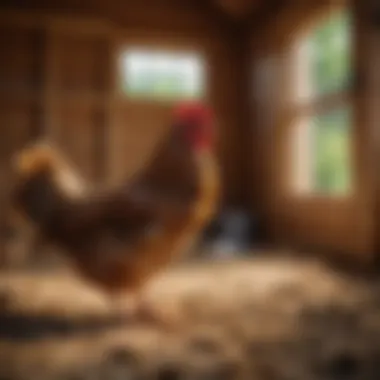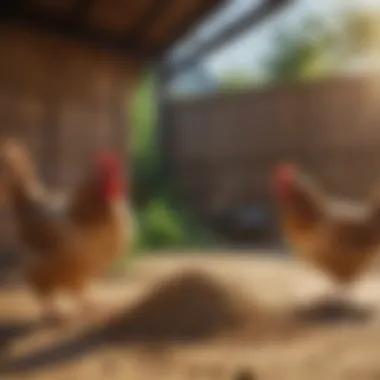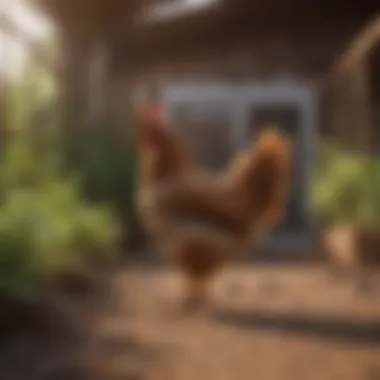Enhancing Chicken Coop Environments with Hemp Benefits


Intro
In recent years, there has been a notable shift towards sustainable practices in poultry management. This evolution has highlighted the significance of hemp as an innovative material in chicken coop environments. As the demand for eco-friendly solutions rises, understanding the role of hemp becomes essential for poultry farmers and chicken enthusiasts alike.
Hemp is not only versatile but also rich in benefits, including improved health for chickens and enhanced productivity for farmers. By examining the physical properties, health advantages, and practical uses of hemp, this article aims to provide a thorough exploration of how this fiber can contribute to better chicken coops.
Sustainable Material Properties of Hemp
Hemp possesses unique qualities that make it a compelling choice for construction and maintenance purposes. It is naturally resistant to mold and pests, which reduces the need for harmful chemicals and enhances the living conditions for chickens.
- Absorbency: Hemp bedding absorbs moisture effectively, maintaining a drier and healthier environment for poultry.
- Insulation: Hemp provides good insulation, contributing to a more stable temperature in the coop.
- Biodegradability: Unlike synthetic materials, hemp breaks down naturally, minimizing waste impact on the environment.
Health Benefits for Chickens
Utilizing hemp in chicken coops can lead to significant health improvements for poultry, thereby enhancing productivity. The use of hemp bedding can help reduce the risk of respiratory issues caused by ammonia release from waste.
- Respiratory health: Hemp's natural properties help reduce ammonia buildup, promoting better air quality in the coop.
- Skin health: Offering hemp-based bedding can minimize skin irritations and other related health problems caused by traditional bedding materials.
Practical Applications in Coop Management
Implementing hemp into chicken coop management involves a variety of practical approaches. From selecting the right type of hemp to ensuring proper maintenance practices, the following points are critical:
- Choosing the right hemp type: When selecting hemp bedding, consider the fineness of the material, as this can affect how well it absorbs moisture.
- Application techniques: Layering hemp bedding in a coop provides enhanced comfort for chickens while allowing for easy clean-up.
- Regular maintenance: Regularly replacing hemp bedding ensures the coop remains dry and hygienic, further promoting chicken health.
“Integrating hemp into chicken habitats can fundamentally change the way poultry is raised, leading to sustainable practices that benefit both chickens and farmers.”
Best Practices for Hemp Integration
Establishing effective practices for integrating hemp in chicken coops can maximize its benefits. Here are steps to consider:
- Assess coop size: Understand the spatial requirements before determining the amount of hemp bedding necessary.
- Monitoring moisture levels: Regular checks help ensure the environment remains optimal for your poultry.
- Adaptation: Be flexible and open to adjusting methods based on the observed behavior and comfort of chickens.
Adopting hemp for chicken coop environments serves as an innovative approach to poultry management. The advantages of hemp contribute not only to the well-being of the birds but also to the sustainability of the farming practices. As more poultry enthusiasts recognize the positive impacts hemp can have, the industry moves closer to a more eco-friendly and health-conscious future.
Prologue to Hemp in Poultry Management
The integration of hemp in poultry management is an evolving concept that draws significant attention from both hobbyist and commercial poultry producers. Focusing on its sustainable qualities and potential health benefits, hemp presents an alternative bedding material that can markedly enhance the living conditions in chicken coops. As concerns about environmental sustainability rise, understanding the role of hemp can lead to more responsible practices in poultry farming.
Understanding Hemp as a Material
Hemp is a versatile plant that has been utilized across various sectors due to its unique properties. Its fibers are robust, naturally resistant to pests, and environmentally friendly. Preserving its natural characteristics, hemp does not require harsh pesticides for growth. Thus, using hemp in chicken coops supports organic farming principles. The absorbent quality of hemp bedding helps maintain a dry environment, reducing the risk of disease and promoting overall chicken health. Moreover, the biodegradability of hemp contrasts sharply with synthetic materials that may linger in landfills. This eco-friendly aspect resonates well with modern agricultural philosophies.
Historical Use of Hemp in Agriculture
Historically, hemp has been employed in agriculture for centuries. Various cultures have recognized its beneficial attributes, using it for multiple purposes ranging from textiles to cordage. In the early days of American agriculture, hemp was even cultivated for its robust fibers, which were essential for making strong ropes and sails. Its usage in livestock bedding is less documented but equally important. Many farmers have relied on its organic advantages before more synthetic alternatives became available. Revisiting these historical practices can inform contemporary methods of poultry management and encourage a shift towards more sustainable options, such as incorporating hemp into chicken coop environments.
Hemp offers a sound choice for poultry management, emphasizing health, sustainability, and historical wisdom.
Benefits of Using Hemp in Chicken Coops
Hemp is increasingly being recognized for its diverse benefits in chicken coops. Understanding these advantages is crucial for poultry keepers aiming to enhance both the welfare of their chickens and the sustainability of their practices. The role of hemp goes beyond just being an alternative bedding material; it influences several aspects of poultry management, including environmental impact, chicken health, and production efficiency.
Sustainability and Environmental Impact


The sustainability of hemp is one of its most significant benefits. As a plant, hemp grows rapidly and requires minimal resources. It can thrive in various climates and does not require large amounts of pesticides or herbicides, making it an eco-friendly choice for bedding. By using hemp in chicken coops, poultry keepers contribute to reducing their carbon footprint. Additionally, hemp’s fast growth means it can be harvested several times a year, promoting crop rotation and soil health.
From an environmental perspective, hemp also improves nitrogen content in the soil when used as a bedding material. As it decomposes, it adds nutrients back into the ground, aiding in the overall health of the coop’s ecosystem. This emphasizes the role of hemp as not just a product, but as a component that can foster a more sustainable and resilient agricultural practice.
Health Benefits for Chickens
Reduction of Diseases
Using hemp in chicken coops can lead to a notable reduction in diseases among the birds. A key factor of hemp is its natural antifungal and antibacterial properties. This characteristic helps to create a cleaner living environment, which is essential for the health of the chickens. Keeping disease at bay is crucial in poultry management and using hemp as bedding material can be a beneficial strategy for mitigating health risks.
Moreover, the high absorbency of hemp helps to manage moisture levels more effectively, greatly reducing the risks associated with damp conditions that can facilitate the growth of pathogens. Therefore, introducing hemp bedding can help promote overall health in chicken flocks.
Improved Air Quality
Improved air quality is another significant health benefit associated with using hemp. Chickens are sensitive to air quality, and poor ventilation can lead to respiratory issues. Hemp bedding controls odors and reduces ammonia levels more effectively than traditional materials such as straw or wood shavings. The natural properties of hemp can lead to an environment that is more comfortable and healthier for birds.
Furthermore, the fine fibers of hemp allow for better airflow in the coop, aiding in maintaining a healthier environment. When considering bedding options, the air quality factor is often overlooked, but it certainly plays a critical role in the overall welfare of chickens.
Enhanced Egg Production
The use of hemp can also promote enhanced egg production. Healthier birds tend to be more productive, and by creating an optimal living environment through the use of hemp, poultry keepers may see improvements in egg yield. The combination of improved health and reduced stress levels contributes to chickens laying eggs more consistently. When hens are comfortable and healthy, their natural productivity is enhanced, thus improving their output.
Comparative Analysis: Hemp vs.
Traditional Bedding Materials
A thorough assessment of hemp in comparison to conventional bedding materials is essential for several reasons. First, it helps poultry owners make informed decisions about their coop setups. Second, understanding the specific elements and benefits of each option can lead to enhanced health and productivity for chickens. This section evaluates cost-effectiveness, durability, and absorbency levels, showcasing the advantages of adopting hemp as a primary bedding material.
Cost Effectiveness
Cost is a significant factor for many chicken coop owners. Hemp bedding can be perceived as more expensive upfront. However, its longevity and reduced need for frequent replacement can result in lower long-term costs. When considering the overall lifecycle, including maintenance and replacements of traditional bedding like pine shavings or straw, hemp often proves to be more economical.
- Unlike wood shavings, hemp does not break down quickly, reducing the amount needed over time.
- It can be composted after use, contributing to sustainability and lowering disposal costs.
In sum, while the initial investment in hemp may be higher, its cost-effectiveness over time cannot be ignored, especially when considering the health benefits it can provide to the flock.
Durability and Maintenance
The durability of bedding materials is critical for maintaining a clean and healthy coop. Hemp has superior durability compared to many traditional options. It tends to withstand wear and tear, resulting in less frequent replacement. This durability reduces the overall labor involved in maintaining the coop.
- Hemp bedding resists molding and can protect against pests far better than straw or hay, which can harbor rodents and insects.
- Its ability to stay dry and not compact too much means that chickens have a more comfortable surface to rest on.
Implementing hemp in a chicken coop can lead to easier maintenance and less time spent managing the bedding, allowing owners to focus on other important aspects of poultry care.
Absorbency Levels
Absorbency is a crucial factor in maintaining a healthy coop environment. Hemp excels in this area, providing a higher absorbency rate than many traditional materials. The ability of hemp to manage moisture plays a significant role in overall coop hygiene.
- Hemp fibers absorb moisture effectively, helping to control odors and prevent the buildup of harmful bacteria.
- This capability leads to improved air quality within the coop, which can reduce respiratory issues among the chickens.
Utilizing hemp bedding contributes greatly to a cleaner and more sanitary environment for both chickens and owners, enhancing the overall health of the flock. The comparative analysis indicates that hemp considerably outperforms traditional bedding materials in cost-effectiveness, durability, and absorbency, making it a compelling choice for chicken coop environments.
Hemp Products Suitable for Chicken Coops


Hemp has a range of products that are proving beneficial in chicken coop management. These products not only improve the living conditions for chickens, but they also contribute to a more sustainable and eco-friendly approach in poultry farming. Emphasizing hemp in chicken coops can enhance overall productivity and health, making it a crucial subject in this conversation.
Hemp Bedding Options
Hemp bedding is a popular choice among chicken owners. The natural fibers are highly absorbent, making them excellent for controlling moisture in the coop. This property reduces the chances of bacterial growth, which is vital for maintaining a healthy environment. Additionally, hemp bedding decomposes easily. This can contribute to soil health if used as compost after it is replaced.
Hemp bedding is also softer compared to straw or wood shavings. Chickens are sensitive creatures, and providing a comfortable surface for them to rest and move about is essential. Moreover, hemp naturally contains antibacterial properties. This feature can help prevent common diseases among poultry. Owners often report fewer health issues among their chickens when using hemp bedding.
Hemp Fiber for Coop Construction
Using hemp fiber in construction is gaining traction. Hempcrete, a composite material made from hemp hurds and lime, is a sustainable option for building chicken coops. This material is not only lightweight but also offers excellent insulation. It helps to regulate temperature inside the coop, keeping the chickens comfortable regardless of external weather conditions.
Another advantage of hemp fiber is its durability. Structures made from hemp can withstand various environmental stresses. Unlike traditional wood, which may warp or decay over time, hemp materials are more resilient, ensuring a longer lifespan for the coop. Additionally, using hemp fibers can reduce the carbon footprint of construction, aligning with sustainable farming practices.
Hemp as a Nutritional Supplement
Feeding chickens hemp seeds or incorporating hemp oil into their diet has potential health benefits. These seeds are rich in essential fatty acids, which can enhance overall health and increase egg quality. Chickens fed hemp seeds may experience improved reproductive health, leading to better egg production. Some studies suggest that hemp can contribute to a balanced diet, further supporting the argument for its incorporation into poultry feed.
Including hemp as a nutritional supplement is straightforward. It can be added to usual feed without major adjustments. However, it’s wise for chicken owners to consider the right amounts, as with any supplement. Consulting with a vet can ensure the right balance to maximize benefits without risking over-supplementation.
The introduction of hemp products into chicken coops not only enhances the living conditions of the chickens but also promotes sustainable farming practices.
Practical Applications of Hemp in Chicken Coop Management
Incorporating hemp into chicken coop management presents various practical applications that enhance the living environment for poultry. This section examines specific methods to implement hemp, focusing on the benefits and considerations of using hemp materials in coop structures and bedding systems. Utilizing hemp can lead to a healthier, more sustainable, and efficient environment for chickens.
Setting Up a Hemp Bedding System
Preparation
Preparation is crucial when setting up a hemp bedding system in chicken coops. This initial phase involves selecting the right type of hemp and understanding its properties and characteristics. Different forms of hemp bedding are available, including shiv and pulp, each offering unique benefits. The primary characteristic of these bedding options is their excellent absorbency, which helps in maintaining dry and clean living spaces for chickens. This aspect is particularly valuable as wet bedding can lead to health issues in poultry.
Moreover, preparing the coop involves ensuring proper ventilation. Adequate airflow prevents dampness and the growth of harmful bacteria, contributing to better chicken health. The preparation stage sets a solid foundation for the entire bedding system, making it a beneficial choice for enhancing chicken coop environments. Consequently, farmers can rely on hemp bedding for easier maintenance and reduced waste in their coops.
Installation Techniques
Effective installation techniques for hemp bedding vary by coop design, but the goal remains the same: to create an optimal environment for chickens. A key characteristic of these installation methods is their adaptability to different coop layouts and sizes. For example, spreading a layer of hemp bedding about four to six inches deep provides insulation and absorbs moisture efficiently. This depth strikes a balance between comfort and functionality.
One unique feature of hemp bedding installation is its ease of application. Unlike traditional bedding materials, which can be bulky and challenging to manage, hemp is lightweight and can be easily spread across the coop floor. This attribute helps in reducing labor and time needed for installation, making it an convenient choice for busy coop owners. However, one should consider the initial cost of hemp, as it might be higher than common bedding types, but the advantages in maintenance and health benefits often justify the expense.
Maintaining a Healthy Coop Environment
To ensure a healthy environment within the chicken coop, regular maintenance practices are essential. Hemp bedding naturally decomposes over time, which reduces the need for frequent replacement. Proper maintenance includes regularly checking moisture levels and replacing bedding when necessary. Additionally, cleaning the coop regularly helps remove any waste, ensuring that food and water sources remain uncontaminated.
By adopting a routine maintenance schedule, chicken owners not only promote the health of their flock but also contribute to a sustainable farming practice. Utilizing hemp for both bedding and coop construction can minimize waste and create a cleaner habitat. Thus, keeping both the chickens and their owners satisfied and healthy is possible by incorporating mindful practices aligned with the advantages of hemp.
Using hemp in chicken coop management combines sustainability with practicality, leading to improved outcomes for both poultry and farm owners.
Challenges and Considerations When Using Hemp
Using hemp in chicken coop environments offers many benefits, but certain challenges also come to the fore. Addressing these considerations is key for coop owners to make informed choices. Understanding potential difficulties surrounding availability, sourcing, and allergies can impact the effectiveness and safety of hemp usage.
Availability and Sourcing


One of the primary challenges in utilizing hemp is its availability and sourcing. While hemp is a versatile crop, its production still faces restrictions in some regions. This may lead to inconsistent supply, making it harder for chicken coop owners to obtain quality hemp products.
When seeking hemp bedding or other products, it is advisable to establish reliable relationships with suppliers. Here are some tips on sourcing hemp:
- Research local farms or suppliers who specialize in hemp products.
- Consider online marketplaces that focus on sustainable materials.
- Join forums or groups in agricultural communities to get recommendations.
Additionally, the quality of hemp can vary. It is crucial to obtain products that are free from pesticides and contaminants. This will help ensure the health of your flock.
Potential Allergies in Chickens
Another consideration when incorporating hemp into chicken coops is the potential for allergic reactions in chickens. While hemp is generally recognized as a safe material, some birds may have sensitivities. Prior to using hemp products, it is prudent to monitor the chickens' reactions.
Symptoms of possible allergies include:
- Sneezing or coughing.
- Excessive scratching or feather loss.
- Changes in eating habits or overall behavior.
To mitigate risks, consider the following strategies:
- Introduce hemp gradually to the coop and observe the birds carefully.
- Mix hemp bedding with other approved materials initially to see how chickens react.
- Consult with a veterinarian to discuss any specific health concerns.
Future of Hemp in Poultry Farming
The future of hemp in poultry farming holds significant promise, particularly as industries shift towards more sustainable practices. This shift is crucial given the growing environmental concerns associated with traditional farming methods. Hemp's unique properties position it as an essential resource in improving chicken coop environments, offering benefits for both poultry health and overall productivity.
Emerging Trends in Sustainable Farming
The demand for sustainable farming solutions is rising. Farmers are increasingly interested in methods that lower carbon footprints and enhance environmental sustainability. Hemp plays a pivotal role in this trend for several reasons:
- Biodegradability: Hemp products break down naturally over time, minimizing waste and pollution.
- Soil Health: Hemp enhances soil structure and fertility, making it an excellent crop for rotation in sustainable farming practices.
- Water Usage: Hemp typically requires less water than other traditional crops. This efficiency is incredibly relevant in water-scarce areas, indirectly benefiting poultry farming by conserving vital resources.
The continuous focus on these trends could lead to widespread adoption of hemp as a staple in poultry management. This encourages farmers to re-evaluate their practices for better sustainability outcomes.
Research and Development in Hemp Products
Ongoing research into hemp and its application in poultry farming is critical. Studies focus on various aspects, including enhancing product quality and discovering new uses. This research is vital for harnessing the full potential of hemp in poultry farming.
- Nutritional Benefits: Current research is investigating how hemp seeds can serve as a valuable nutrient source in poultry feed. Enhanced feed quality may lead to healthier chickens and increased egg production.
- Development of Innovative Products: Researchers are exploring new applications for hemp in coop construction, with a focus on durability and cost-effectiveness. This can lead to better building materials that are sustainable and efficient.
- Health Monitoring: Studies are also looking into the health effects of hemp-based bedding. Understanding how it affects air quality and chicken well-being is essential for farmers seeking optimal environments for their flocks.
Emerging scientific findings will play a crucial role in shaping the future of hemp utilization in poultry. They provide the necessary insights that can drive the acceptance and implementation of hemp practices in the industry.
Understanding these trends and research findings allows farmers to make informed choices about implementing sustainable practices in poultry management.
Closure and Recommendations
The integration of hemp into chicken coop environments presents multiple benefits that can significantly influence poultry management. As discussed throughout the article, hemp's properties offer both sustainability and health benefits for chickens, enhancing their living conditions and overall productivity. Addressing key aspects such as material versatility and environmental friendliness, hemp proves to be a valuable resource for chicken coop owners.
Summary of Key Benefits
The advantages of using hemp in chicken coops can be summarized as follows:
- Sustainable Resource: Hemp growth requires less water and pesticides compared to other crops, making it a preferred choice for environmentally conscious farming.
- Health Advantages: Hemp bedding helps reduce ammonia levels in the coop, leading to improved air quality. This can decrease the likelihood of respiratory diseases in chickens.
- Enhanced Egg Production: A comfortable and clean environment provided by hemp bedding can lead to increased egg yield, benefitting chicken owners economically.
- Durability: Hemp products tend to last longer than traditional materials, reducing replacement costs and maintenance efforts over time.
Using hemp bedding can create a healthier habitat for chickens, resulting in higher productivity and lower veterinary costs.
Final Thoughts on Hemp Utilization
In consideration of the points discussed, it is clear that the future of hemp in poultry farming is promising. The ongoing trends in sustainable agriculture and increased interest in organic products further support this potential. Prioritizing hemp as a material in chicken coop management not only addresses immediate concerns about flock health and productivity but also aligns with broader environmental goals.
For coop owners contemplating the switch to hemp, it is advisable to do thorough research on sourcing and types of hemp products available. Engaging with local suppliers can facilitate this transition and also ensure quality standards are met. The implementation of hemp in chicken coops is not merely a trend; it represents a shift towards more sustainable and effective poultry management practices.







